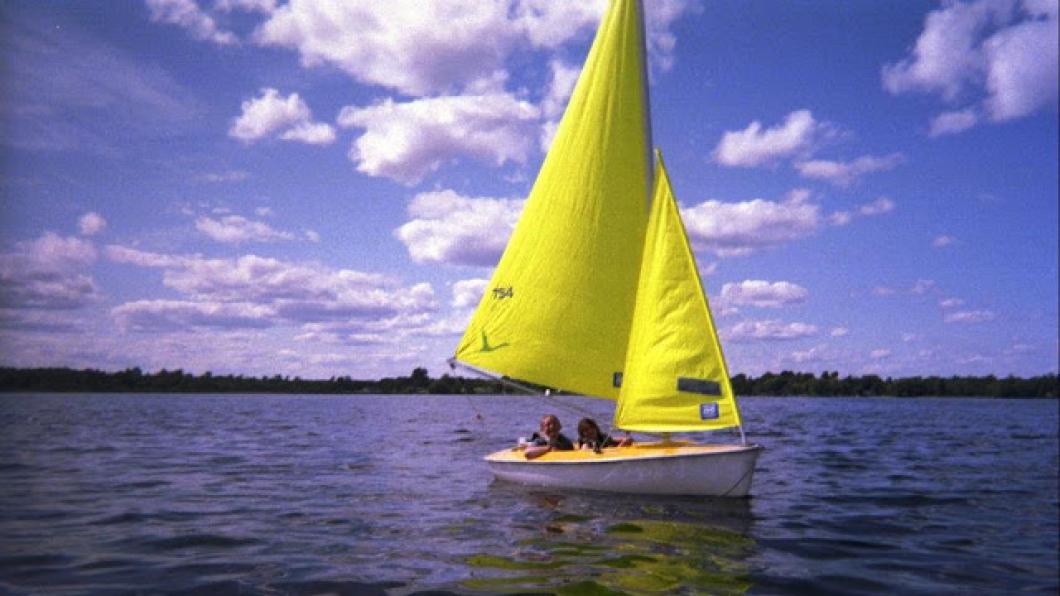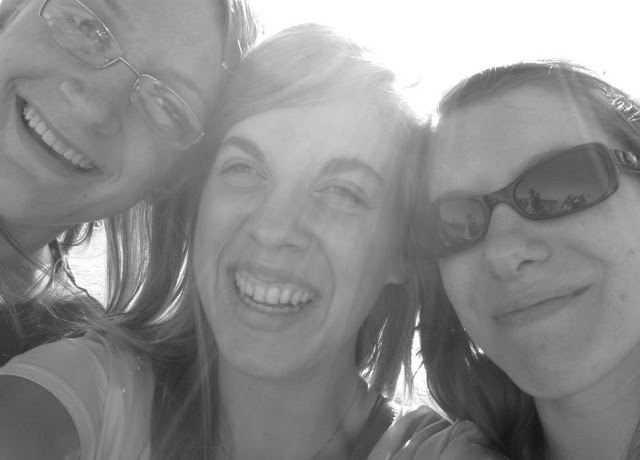
At this camp 'disability didn't matter'
By Jessica Geboers
“Ooh / There is a camp I know/ and it lies on the Rideau / and they call it Merrywood / and you know, they really should.”
These are the opening lines to the Merrywood Song, the anthem of my favourite place on earth: Merrywood Easter Seals Camp in Perth, Ontario, for children and youth with disabilities. However, Merrywood was always much more than just a summer camp to me. From the first five days I spend there in the summer of 1997—my first time alone after two summers of family camp at the former Northwood with my parents—this was a place of accessibly, inclusion, friendship and fun. And as cheesy as it may sound, the friends and memories made there really do last a lifetime.
I’m still in touch with Erin, the counsellor who met me at my car on my first day at Merrywood. Not only did she look out for me that session and every session we’ve spent there since, but we’ve stayed in touch over the years through letters and Christmas cards. Nowadays, Facebook helps keep us up to date on the happenings in each other’s lives.
I think it was the summer of 2002 when I didn’t get into Merrywood but instead was offered a place at Camp Lakewood. I was in utter despair over not getting into Merrywood—my 12-year-old life was over as I knew it. But I was happy to be going to camp somewhere. And, as it turned out, this was one of the best things to ever go wrong in my life.
At Lakewood, I met my best friends in the world. Not long after arriving, I met Hanako. She was in the bed next to mine and our first interaction involved her helping me to disentangle my walker from my wheelchair. I’m pretty sure she thought I was quite daft for getting into such a predicament, but it was nice of her to help.
The previous year, Merrywood had acquired a collection of untippable and unsinkable sailboats that could be maneuvered easily from a comfortable seat with a joy stick and single rope operating the sail. Sailing quickly became my favourite activity, pushing swimming to second place. I love the freedom and exhilarating speed when I catch the wind just right.
Lakewood also had these sailboats, and pretty good wind conditions as well. When Hanako and I arrived at the beach for sailing on the second day of camp, it was quickly established that, due to short staffing, we would be sent in a boat together as we were both experienced sailors. Darren, an attractive Irish sailing instructor, whom I immediately had a huge crush on to the point of being speechless, had trained Hanako the summer before.
So off we went. The thing about spending two hours in a boat, with little else to do but sail and talk, is that you either come back friends or foes. Luckily for us, we discovered that we had a fair bit in common: in addition to a love for sailing, we had similar tastes in music and books, came from Dutch families and were the oldest of three children. We also had a similar form of cerebral palsy so shared a life view in this respect. We returned with the beginnings of a beautiful friendship. From that point on, Hanako and I did everything together, sailing as often as we could. We were even so bold as to ask Darren to rig an additional boat for us when there weren’t enough spaces.
“Hang” was a two-hour period of down-time we spent in or around the cabins every afternoon. Hanako and I would sit side-by-side on my bed or in our wheelchairs, as we quickly discovered that there was just enough space between our two beds to fit both chairs beside each other. We listened to my countless burnt CDs while singing along shamelessly.
Lakewood was not a bad place. The people and the sailing were great. The cabins had yet to be updated but the six, small, wooden buildings fostered a sense of community and tradition. The only downside was that dead fish from Lake Erie often washed up on the beach, giving the entire camp an unfortunate smell.
Despite my love for Merrywood, I followed Hanako back to Lakewood the next summer. She’d never been to another Easter Seals Camp and, like me, dislikes change. Hating to waste a day, she convinced her father to drop her off at 9 a.m. on arrival day and, after some badgering from me, my family dropped me off soon after.
If I remember correctly, after the required rounds of handing in the money our parents had given us to purchase a new Easter Seals T-shirt, checking in with nurses and assuring the waterfront staff that we were still crazy about sailing, we spent the majority of the morning messing around in arts and crafts while meeting new staff and catching up with those returning.
It was later that afternoon while lounging on my bed with Hanako that we met Katie, who would quickly become our third Musketeer and another of my best friends. When she came in I could tell right away that Katie was another highly independent camper like Hanako and I. Her cerebral palsy wasn’t even noticeable to me at first.
It was quite out of character for me then, and still is now, to make the first move to initiate a friendship, but Katie seemed cool and I felt for her as she nervously sat down next to another cabin mate who was much more severely disabled. She looked uncomfortable so I took a chance and said hi, striking up a conversation.
I later found out that this was Katie’s first time at camp, although her twin brother Kasey had come the year before. She was new to camp life and to being around kids with such a wide spectrum of disabilities. She adjusted quickly though, asking Hanako and I questions whenever coming across something she wasn't familiar with.
After Katie and I hit it off, Hanako asked if I was ditching her for Katie. I assured her that I was doing no such thing; I simply thought she could use a friend and the three of us could hang out together, which we did.
We did everything together, except sailing which Katie found boring unless it involved a water war against her brother. Three can be an awkward number (and I won’t say there weren’t disputes over the years) but we usually sorted it out. Not big on sports in general, we often found ourselves together at the pool diving for rings (although Katie floats a little too well for such activities) having sparkle and paint fights in arts and crafts or doing something (often involving food) in Life Skills.
Hanako, Katie and I were an odd trio but were drawn together by our shared independence and friendship. I saw myself as the glue of our group. In addition to the things I have in common with Hanako, Katie appeals to a lighter and more girlie side of my personality. At 14, and even now to a point, Hanako never cared much about clothes, make-up or hair. On the flipside, Katie, to our slight disappointment, has never had much interest in picking up a Harry Potter book or watching A Walk to Remember on repeat.
Lakewood was closed after that summer and after some fantastic times there I was sad to see it go.
Once home, Katie and I began speaking on the phone almost daily (a habit that would continue until we went to college and upgraded to Skype) and Hanako invited me to stay with her for a couple of weeks in Kitchener-Waterloo. From then on I would visit Hanako after camp each summer and almost every school holiday during the year. Our parents used to take turns driving me back and forth between Bowmanville and Kitchener-Waterloo and when I look back, those two-hour drives were some of my favourite times, often spent singing aloud to our favourite bands (like Switchfoot, Relient K and Coldplay). Although I appreciate the independence it provides, the train ride alone is just not the same.
Off to Merrywood we went the next summer where I proudly introduced them to my favourite place and everyone I knew. Hanako and Katie were happy to admit that this was a nicer place with new, air-conditioned cabin buildings and water on three sides (free from the stench of dead fish). We also enjoyed some additional activities: Hanako and I went white water rafting on the Ottawa River, while the three of us enjoyed beach day and camping in a tent overnight together (Katie, who wasn’t keen on boats at the time, braved the canoes like a champ to partake in these two activities with us).
This continued for the rest of our years at camp, the three of us usually only separating when Hanako and I went sailing. Hanako and I took the summer of 2009 off because we knew we might want to work at Merrywood and were required to take at least one year away to create a bit of separation between camper and staff.
I worked at Merrywood as a cabin counsellor in the summer 2010. It was my first real job and a lot harder than I expected. I was always tired, but it was still the best job in the world. Hanako came for a session to work as a peer support counsellor. Essentially she was an ex-camper hired to act as a role model for campers who might wonder what life is like with a disability as they get older. It was so much fun to be there together again.
Then life and school got in the way, so I had to take four years off from camp.
I missed it very much and was ecstatic about going back this summer to work for a session as a peer support. It was easier this time as I’m older and know better what to expect. Although I can’t help much with the more physical aspects of the job, such as lifting, I love hanging out with the campers and helping them to enjoy Merrywood as I did, while encouraging them, as I have learned from experience, to be the best they can be.
It’s been suggested to me recently that Easter Seals camp does more harm than good by fostering the idea that those with disabilities should be segregated from their able-bodied peers. I however, disagree. As I’ve written before, I think that mingling between abled and disabled people is important for acceptance and understanding between both parties. But that doesn’t mean that it’s not nice, let alone helpful, for children and youth to spend time with others with shared life experiences—even if it’s only for 10 days a year—in a place so accessible it could be argued that disability doesn’t matter.
Camp was the only place that I can say this was undoubtedly true.
